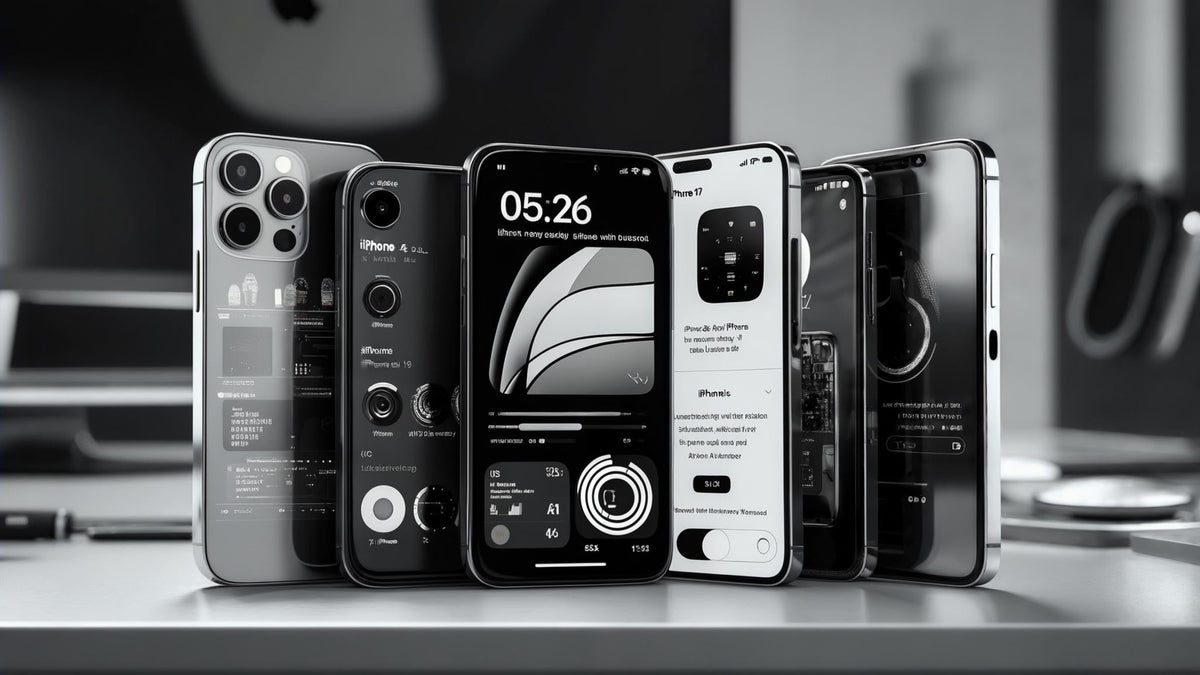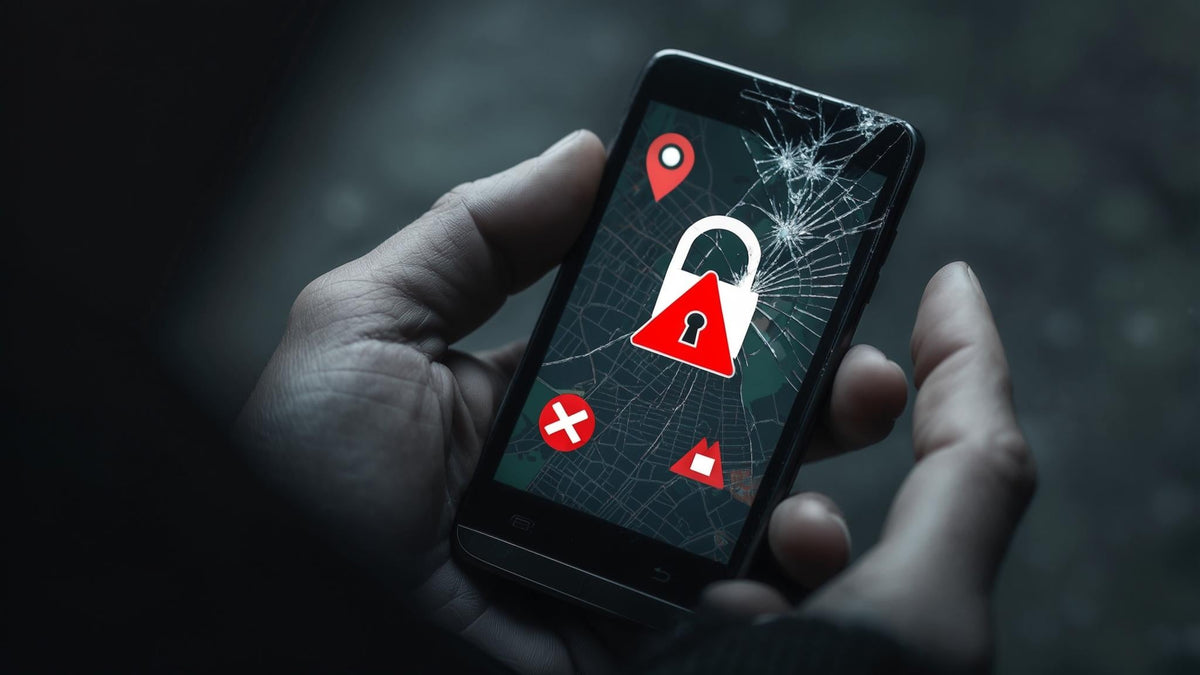Let's be honest—losing your iPhone sucks. But having it stolen? That's a whole different nightmare. I'm talking about strangers scrolling through your photos, accessing your bank accounts, and basically having a field day with your entire digital life.
Here's the thing: most people think iPhone theft is just bad luck. Wrong. With the right setup and some street smarts, you can make your phone a terrible target for thieves. I've spent way too much time researching this stuff (thanks, anxiety), and I'm going to share what actually works to protect your iPhone from theft.
With 6-digit PIN codes creating over 1 million possible combinations, proper security configuration dramatically increases protection against unauthorized access. You'll discover actionable steps that transform your iPhone from an easy target into a fortress of protection.
Table of Contents
Making Your iPhone a Hard Target: Physical Protection Strategies
Your iPhone's Built-in Theft Defense System
Setting Up Your Security Before Trouble Strikes
What to Do When Your iPhone Gets Stolen
Final Thoughts
TL;DR
Rugged cases and secure mounting systems deter opportunistic thieves while protecting your device during theft attempts
iOS 17.3's Stolen Device Protection automatically detects theft scenarios and locks down sensitive functions
Proper Find My configuration creates a crowdsourced tracking network that works even when your phone's offline
Environmental awareness and discrete usage patterns significantly reduce your theft risk profile
Immediate response within the first few hours maximizes recovery chances and minimizes data compromise
Complex authentication methods create multiple barriers that frustrate thieves attempting device access
Making Your iPhone a Hard Target: Physical Protection Strategies
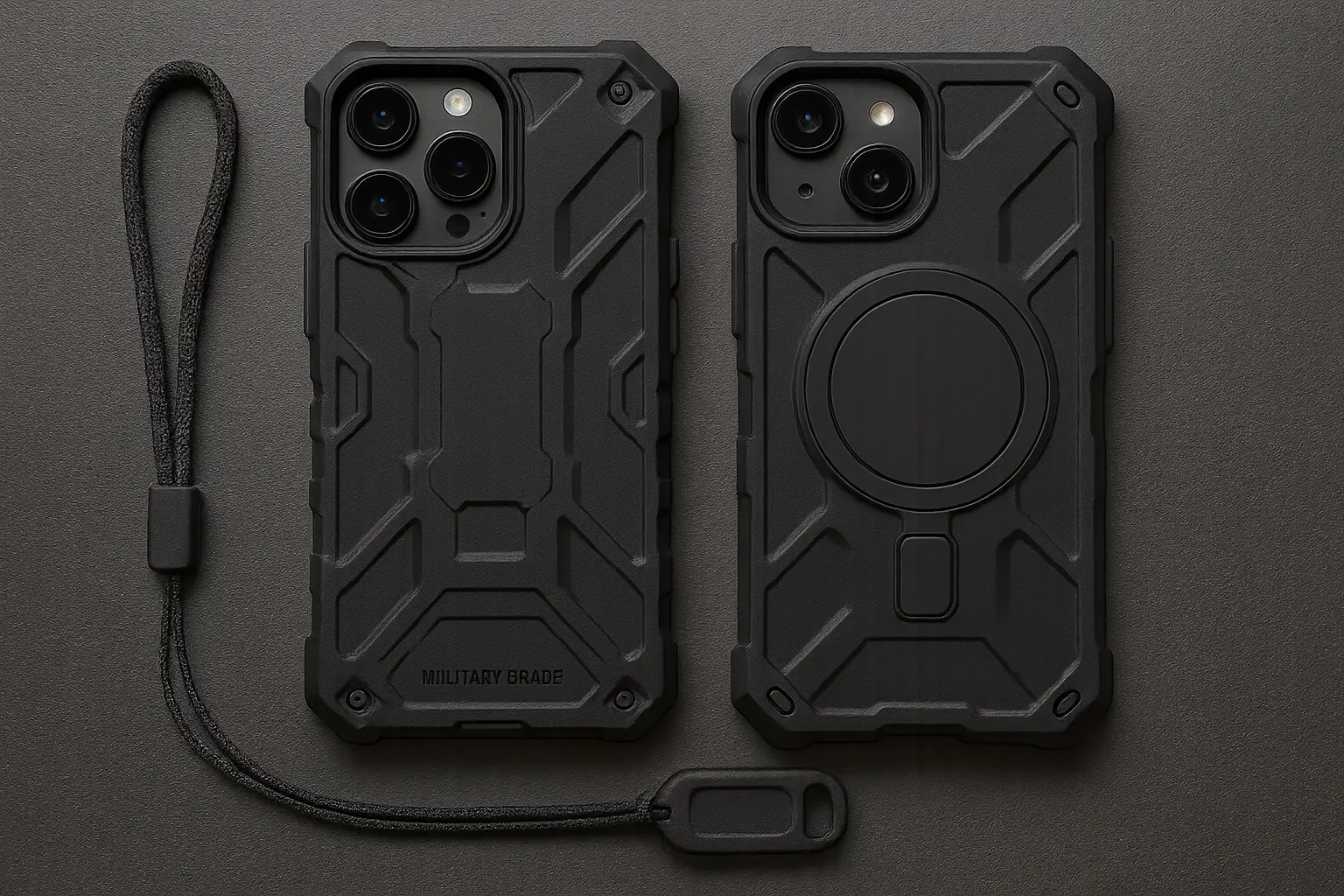
Look, most thieves are lazy opportunists. They want easy targets—not someone who looks like they've got their act together. Your first job is looking like more trouble than you're worth. Smart case selection, environmental awareness, and secure carrying methods form your first line of defense against criminals who target easy marks.
Get a Case That Says "Don't Mess With Me"
Forget those cute clear cases. You want something that screams "this person takes security seriously." Military-grade cases aren't just about drop protection—they're psychological warfare against potential thieves.
When a thief sees your phone wrapped in serious armor, they start wondering: What kind of person needs that level of protection? Probably someone who'll hunt them down if they steal it.
Why Drop Protection Doubles as Theft Prevention
Here's something most people don't think about: thieves drop phones while running. A lot. If your screen cracks during the getaway, your tracking dies with it. A rugged case keeps everything working when you need it most.
Military-grade cases create a psychological barrier for opportunistic thieves. When someone sees your iPhone wrapped in serious protection, they often assume you've got tracking enabled and you're the type of person who'll pursue recovery aggressively.
Understanding the most protective phone cases available can help you choose the right level of security for your lifestyle and risk profile.
Magnetic Mounting: Keeping Your Phone Locked Down
Pro tip: Magnetic mounts aren't just convenient—they're theft deterrents. A phone locked into a mount can't be grabbed and go. Thieves hate anything that slows them down.
Strong magnetic mounts work because they keep your phone visible to you but secured against quick theft. Even at red lights or in parking lots, your device stays put until you deliberately remove it.
The best car phone mounts combine security with convenience, making them essential tools for vehicle-based theft prevention.
The Psychology of Professional-Looking Protection
Professional-grade cases make thieves wonder what kind of person they're targeting. That tactical-looking case might belong to someone in law enforcement, military, or security—people who definitely have their tracking game dialed in.
The visual deterrent works because thieves prefer easy targets. When your case screams "I'm prepared for trouble," most opportunistic criminals move on to someone with a basic case or no protection at all.
Don't Be an Easy Target
Here's where most people mess up: they make themselves obvious victims. Walking around with your shiny phone out, completely absorbed in the screen, in a sketchy area? You might as well wear a sign that says "Rob me."
According to "Phone theft is on the rise" by ZDNet, London's Metropolitan Police reported that phone theft generates £50 million ($67 million) per year in the UK capital alone, with police capturing 1,000 stolen devices and making 230 arrests in just one week.
High-Risk Situations to Watch For
Public transportation tops the list for iPhone theft. Crowded buses, trains, and subway platforms create perfect conditions for grab-and-run thieves. The confined spaces and predictable stops give criminals easy escape routes.
Tourist areas attract thieves because visitors are distracted, unfamiliar with surroundings, and often carrying expensive devices. Popular landmarks, busy shopping districts, and entertainment venues require extra vigilance.
Parking lots, especially poorly lit ones, present unique risks. Thieves target people distracted by loading groceries or getting into cars—moments when your phone might be sitting on your car roof or in your hand while you fumble for keys.
High-Risk Location |
Primary Threat |
Best Protection Strategy |
|---|---|---|
Public Transportation |
Grab-and-run theft |
Keep phone in front pocket, use lanyard |
Tourist Areas |
Distraction theft |
Minimize visible usage, stay alert |
Parking Lots |
Vehicle-related theft |
Secure phone before exiting vehicle |
Crowded Events |
Pickpocketing |
Use body-worn pouches, avoid back pockets |
Restaurant/Café |
Table theft |
Never leave phone unattended |
Stay Aware Without Being Paranoid
The trick is staying aware without being paranoid. Keep your head up between texts. Know who's around you. Trust that weird feeling when something seems off.
Keep your phone usage subtle in high-risk areas. That means no flashy cases, no waving it around while talking, and definitely no setting it down on tables or counters where it's visible to everyone.
The "phone out, head down" posture screams "easy target." Instead, keep your head up between interactions, scan your surroundings regularly, and trust your instincts if something feels off.
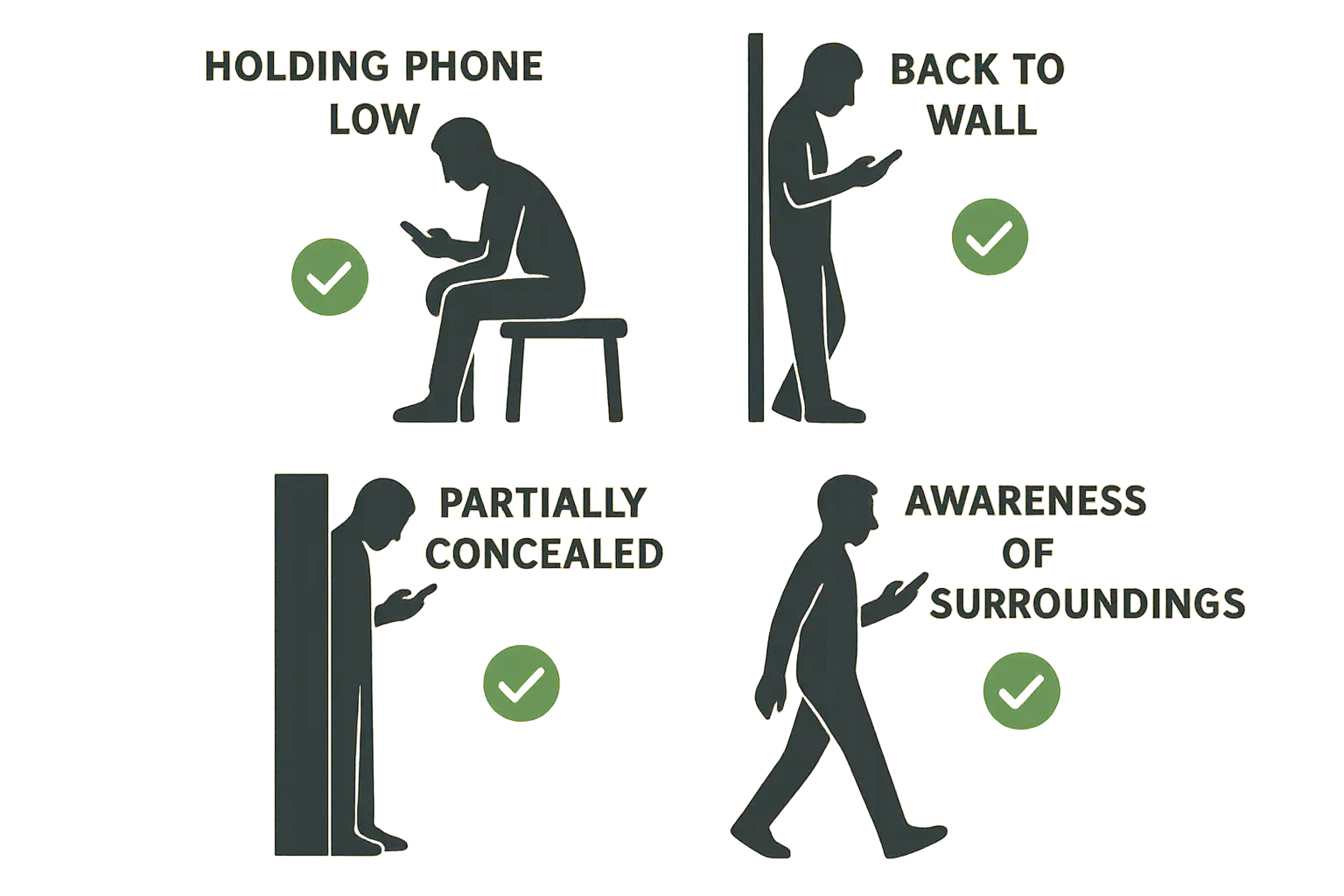
Carry Smart, Not Sorry
How and where you carry your iPhone directly impacts its vulnerability to theft. Certain carrying methods provide significantly better security than others, with body-worn solutions offering the highest level of protection.
Front Pockets Beat Back Pockets Every Time
Front pockets beat back pockets every single time. Pickpockets can't steal what they can't reach without you noticing. Front pocket access requires facing you directly—something most criminals avoid.
Even better? Get one of those hidden pouches that goes under your shirt. Yeah, it's not the most convenient thing ever, but neither is having your phone stolen.
Some people use retractable cables or clips that tether their phone to their body. Sounds paranoid until you realize thieves literally can't run away with a phone that's attached to you. Even if someone grabs your phone, they can't run off with it when it's tethered to your body or bag.
A security consultant I know uses a tactical vest with internal phone pockets during high-risk assignments. The phone stays completely hidden but accessible through a magnetic closure system. Even in crowded protest situations, his device remains secure while staying functional for communication and emergency tracking.
Your iPhone's Built-in Theft Defense System
Apple actually built some pretty clever anti-theft stuff into iOS. The problem is most people don't know it exists or how to use it properly. These built-in features work together to create multiple layers of security that protect your data, track your device, and make stolen iPhones essentially worthless to thieves.
Stolen Device Protection: Your Phone Gets Suspicious
This is the coolest feature nobody talks about. Your iPhone learns your daily routine—where you go, when you unlock it, how you use it. When something feels off, it automatically locks down to protect your iPhone from theft.
iOS 17.3 introduced advanced algorithms that monitor your device usage patterns, location changes, and authentication attempts to identify potential theft scenarios. When suspicious activity is detected, the system automatically escalates security measures.
How Your iPhone Knows Something's Wrong
Say your phone suddenly appears across town at 3 AM, and someone's trying to change your Apple ID password. Your iPhone goes "Nope, something's wrong here" and makes them wait hours before they can do anything important.
Location jumps are the biggest red flag. If your phone goes from your usual neighborhood to across town in an impossibly short time, or if it's being used in areas you never visit, the system assumes something's wrong.
Failed Face ID attempts combined with location changes create a perfect storm for stolen device protection activation. Multiple failed attempts in an unfamiliar location almost always means someone else has your phone.
Automatic Security Lockdown Features
The system gets stricter the weirder things get. Failed biometric attempts in a strange location? Now everything needs extra verification.
Security delays are brilliant—they force thieves to wait hours before accessing critical functions. Want to change the Apple ID password? You'll wait. Need to turn off Find My? Not happening quickly.
Access to sensitive areas gets locked down hard. Banking apps, password managers, and system settings require additional verification that most thieves can't provide.
Remote Security Gets Stronger Over Time
Remote escalation means your phone gets more secure the longer it's away from you. Functions that were accessible with just a passcode might suddenly require biometric confirmation plus waiting periods.
The system can remotely disable certain features entirely. Apple Pay, password autofill, and even basic app installations can be blocked until you verify your identity through trusted devices.
Find My: Your Personal Detective Network
Here's what blows my mind: there are over a billion Apple devices out there that can help find your stolen phone. Your iPhone constantly sends out tiny Bluetooth signals that other iPhones can detect and report back to Apple.
Apple's Find My system creates a massive crowdsourced network using millions of Apple devices to help locate your stolen iPhone. This network functions even when your device is offline, in airplane mode, or has a dead battery.
According to "Protect your business and data if your phone is lost or stolen" by Bitdefender, London experienced a 150% surge in street thefts, with 78,000 phones reported stolen between September 2023 and September 2024, recording a theft rate of 589 phones per 100,000 residents.
Precision Finding is Straight-Up Magic
Even if thieves turn off WiFi and cellular, even if the battery dies—other Apple devices nearby can still track it. In cities, you're almost guaranteed to have iPhones within Bluetooth range.
The precision finding feature is straight-up magic. Once you're close, it literally points you toward your phone with arrows and distance measurements. It's like having a metal detector for your iPhone.
Ultra Wideband technology works like GPS on steroids for close-range finding. Once you're within about 30 feet of your iPhone, the precision finding feature can literally point you to its exact location with directional arrows and distance measurements.
Offline Finding: When Your Phone Goes Dark
Bluetooth Low Energy keeps working even when everything else is turned off. Your phone sends out encrypted location beacons that nearby iPhones, iPads, and Macs can detect and report back to Apple's servers.
The network effect is massive—there are over a billion Apple devices worldwide that can help find your phone. In urban areas, you're almost guaranteed to have Apple devices nearby that can relay your phone's location.
Thieves can't easily defeat this system because they'd need to know about Bluetooth Low Energy broadcasting and have the technical knowledge to disable it. Most criminals just turn off WiFi and cellular, which doesn't stop offline finding.
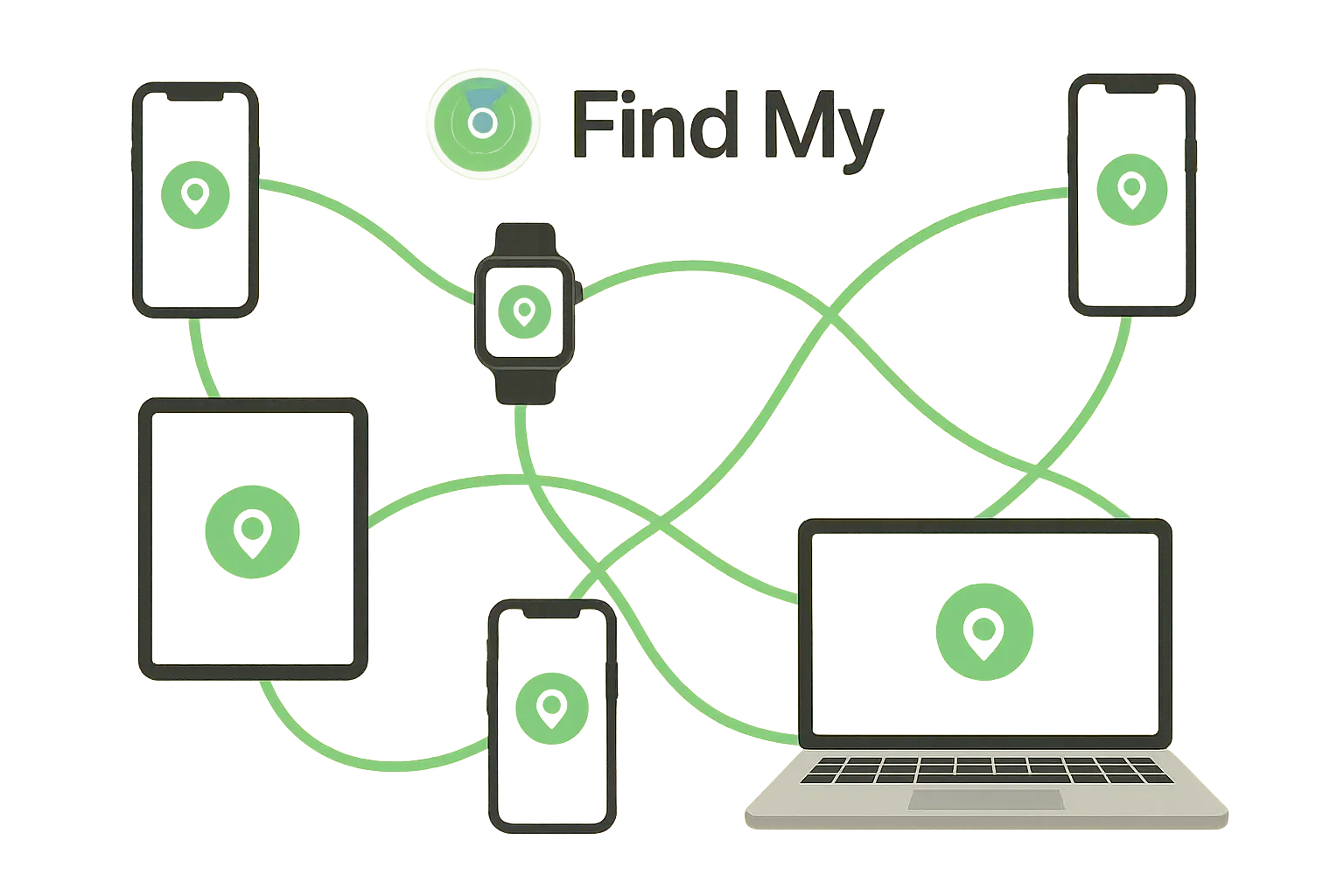
Activation Lock: Making Stolen Phones Worthless
This is probably the best anti-theft feature Apple ever created. Once your phone is reported stolen, it becomes a very expensive paperweight.
Activation Lock automatically engages when Find My is enabled, making your iPhone essentially worthless to thieves by requiring your Apple ID and password for any meaningful use. This feature has dramatically reduced iPhone theft rates by eliminating the resale value of stolen devices.
Factory Reset Won't Save Thieves
Factory reset? Doesn't matter. New SIM card? Still locked. Even replacing parts won't help. The phone is permanently tied to your Apple ID, and there's no way around it.
Activation Lock kicks in automatically—you don't need to do anything special to enable it. As long as Find My is turned on, your phone becomes locked to your Apple ID the moment it's reported stolen or goes missing.
The lock persists even through hardware changes. Replacing parts or attempting to modify the device won't remove Activation Lock, making stolen iPhones essentially worthless for parts or resale.
Your Nuclear Option: Remote Wipe
This single feature has made iPhone theft way less profitable, which means fewer people bother trying.
Remote wipe gives you the nuclear option when recovery isn't possible. You can erase everything on your phone remotely, ensuring your personal data doesn't fall into the wrong hands.
The timing of remote wipe matters. Sometimes it's better to leave tracking enabled for a few days to see if you can recover the device before wiping it completely.
A business executive had her iPhone stolen at a conference. Instead of immediately wiping the device, she monitored its location through Find My for 48 hours. The phone moved to a residential area and stayed there, allowing police to recover it along with two other stolen devices. Had she wiped it immediately, the tracking capability would have been lost.
Setting Up Your Security Before Trouble Strikes
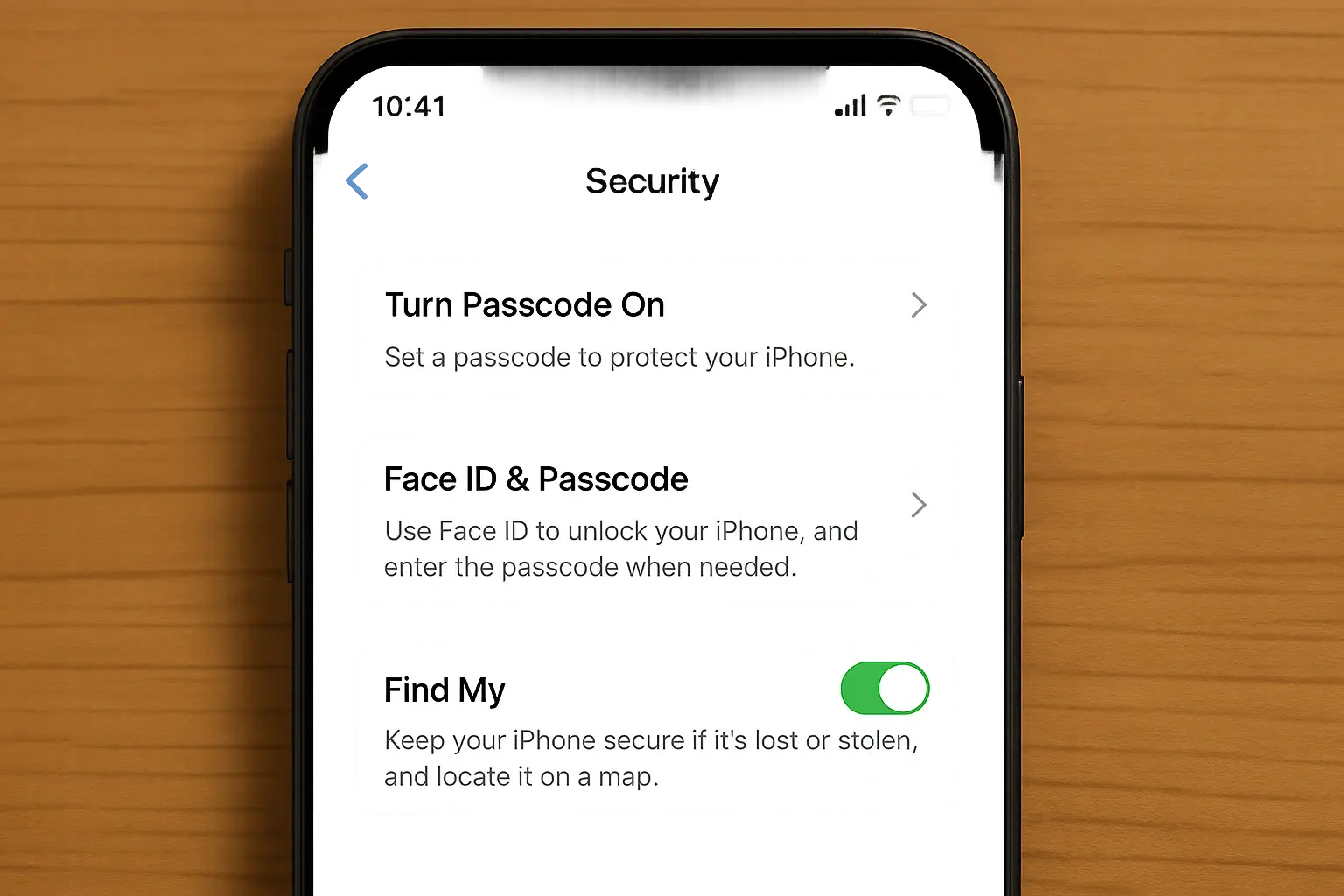
Most people only think about security after their phone gets stolen. Don't be most people. Proper security configuration before theft occurs is crucial for maximum protection and recovery success. The right settings can mean the difference between getting your phone back and losing it forever.
The Settings That Actually Matter
Specific configuration steps dramatically improve your iPhone's theft resistance and recovery potential. These settings work together to create multiple layers of protection that activate automatically when your device is compromised.
Turn on Find My Everything
Navigate to Settings > [Your Name] > Find My > Find My iPhone and toggle it on. This single setting enables the entire Find My ecosystem, including Activation Lock and remote location tracking.
Enable "Find My network" to tap into Apple's crowdsourced finding system. This feature allows other Apple devices to help find your phone even when it's offline or in airplane mode.
Turn on "Send Last Location" so your phone automatically reports its position to Apple when the battery is critically low. This gives you one final location ping before the device dies completely.
Enable Stolen Device Protection
Go to Settings > Face ID & Passcode > Stolen Device Protection and toggle it on. You need iOS 17.3 or later. This is your iPhone's smart bodyguard that learns your patterns and locks down when something seems fishy.
The system starts learning your patterns immediately after activation. It monitors where you typically use your phone, when you unlock it, and how you interact with sensitive functions.
Security delays kick in automatically when the system detects suspicious activity. Functions requiring stolen device protection will implement waiting periods and additional authentication.
Lock Down Your Settings
Navigate to Settings > Screen Time > Content & Privacy Restrictions and turn on restrictions. You'll set a separate Screen Time passcode that's different from your device unlock code.
Under Account Changes, select "Don't Allow" to prevent anyone from modifying your Apple ID settings, even with device access. This stops thieves from changing passwords or disabling Find My.
Restrict passcode changes and Face ID modifications to prevent thieves from locking you out of your own device. These restrictions require your Screen Time passcode to modify.
Security Setting |
Location |
Purpose |
Priority Level |
|---|---|---|---|
Find My iPhone |
Settings > [Name] > Find My |
Device tracking and recovery |
Critical |
Stolen Device Protection |
Settings > Face ID & Passcode |
Automatic theft detection |
High |
Screen Time Restrictions |
Settings > Screen Time |
Prevent security changes |
High |
Auto-Lock (30 seconds) |
Settings > Display & Brightness |
Minimize unlocked exposure |
Medium |
Control Center Lock |
Settings > Face ID & Passcode |
Prevent airplane mode activation |
Medium |
Passwords That Don't Suck
Multiple layers of authentication create significant barriers for thieves attempting to access your device and accounts. Proper biometric setup combined with complex passcodes makes unauthorized access extremely difficult and time-consuming.
Ditch the 4-Digit Code
Ditch the 4-digit passcode. Just do it. Six digits minimum, and avoid obvious stuff like 123456 or your birthday. Those extra two digits exponentially increase the number of possible combinations, making brute force attacks much more difficult.
Alphanumeric passcodes offer the highest security but require more effort to enter. Consider this option if you work in high-risk environments or store particularly sensitive information on your device.
Avoid obvious patterns such as repeated digits or dates related to your life. Thieves often try common combinations first, and personal information is easier to guess than you'd think.
Face ID Setup That Actually Works
Face ID is great, but set it to require attention—meaning you actually have to look at your phone with your eyes open. Thieves can't just point it at your unconscious face.
Enroll multiple angles of your face in different lighting conditions. This improves legitimate unlock success while maintaining security, since thieves still can't replicate your specific facial features.
For Touch ID devices, register multiple fingerprints from different fingers and angles. This gives you backup options while ensuring thieves can't easily guess which finger to use or how to position it.
Pre-Theft Security Checklist:
Find My iPhone enabled with network finding
Stolen device protection activated (iOS 17.3+)
6-digit or alphanumeric passcode set
Face ID/Touch ID configured with attention required
Screen Time restrictions enabled for account changes
Control Center disabled on lock screen
Auto-lock set to 30 seconds maximum
IMEI number recorded and stored securely
Regular iCloud backups scheduled
Emergency contacts configured in Medical ID
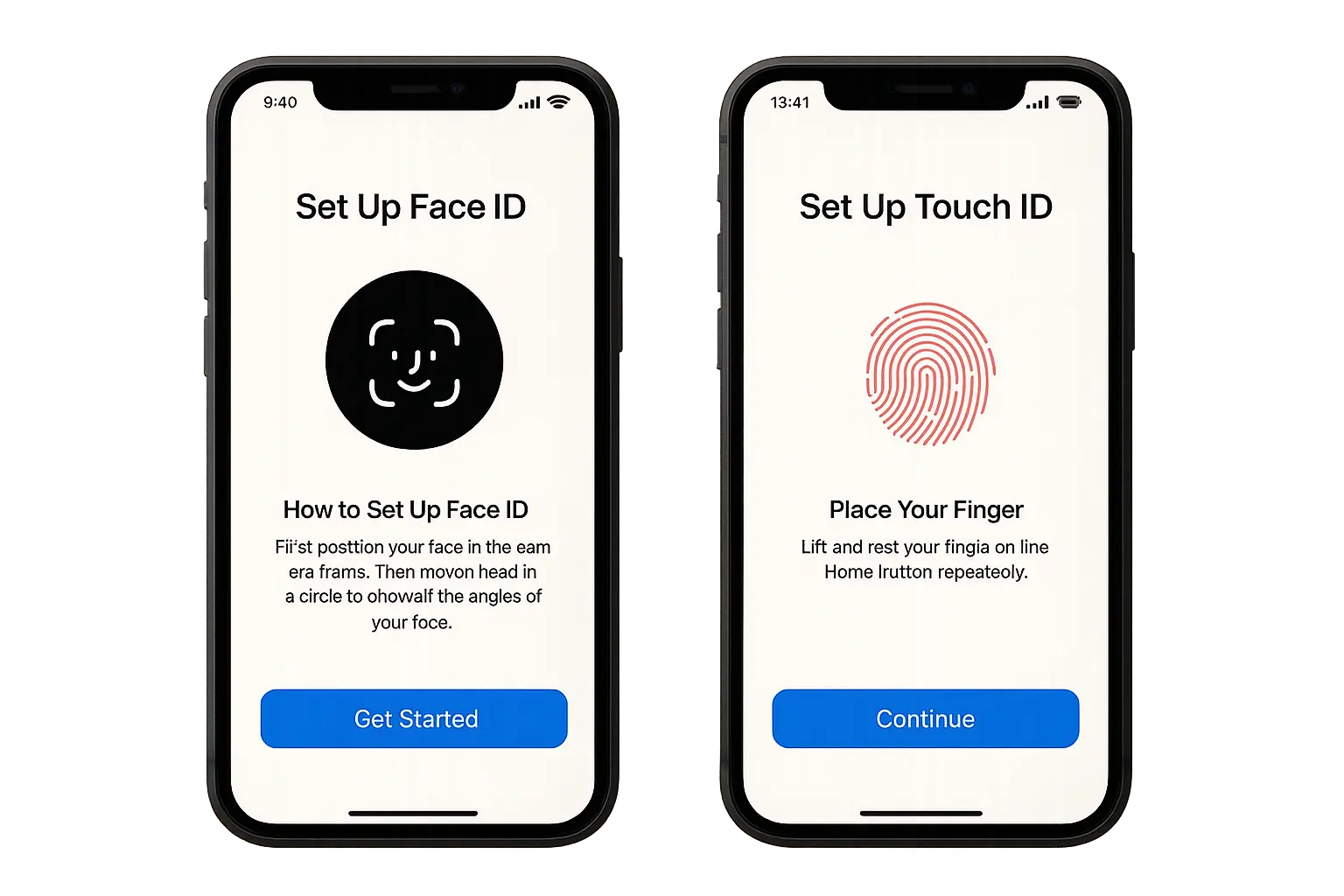
What to Do When Your iPhone Gets Stolen
Okay, it happened. Your phone is gone. Don't panic—but do move fast. When theft occurs, your response in the first few hours determines whether you'll recover your device and how much damage the thieves can do to your digital life.
The First Hour is Everything
The initial response period is critical for device recovery and damage control. Quick action with Find My, remote security activation, and law enforcement contact can make the difference between getting your phone back and losing it permanently.
Step 1: Get to Find My Immediately
Jump on Find My immediately using another Apple device or go to iCloud.com on any computer. Every minute counts because thieves might turn off the phone or put it in airplane mode once they realize it's trackable.
Watch the location updates in real-time if possible. Moving locations might indicate the thief is still carrying your phone, while a stationary location could mean they've ditched it or taken it somewhere specific.
Screenshot location data and movement patterns. This information becomes crucial evidence for police reports and helps establish timelines for recovery efforts.
Step 2: Lost Mode Right Away
Put it in Lost Mode right away. This locks the phone and lets you display a message with your contact info. Sometimes people will actually call to return it for a reward.
Enable Lost Mode instantly through Find My. This locks your phone with a custom message and contact number while continuing to track its location in the background.
Lost Mode disables Apple Pay and prevents access to personal information while keeping basic phone functions available for contact. This balance protects your data while enabling recovery.
Step 3: Call the Police
Call the police. Yes, really. Get a report number and give them your phone's location from Find My. Don't try to confront thieves yourself—that's how people get hurt.
File a police report immediately with your device's serial number and IMEI. You can find these in Settings > General > About, or on your original purchase receipt if you still have it.
Many cities have dedicated smartphone theft units that understand Find My data and can act quickly on location information. Ask specifically for these specialized officers when filing your report.
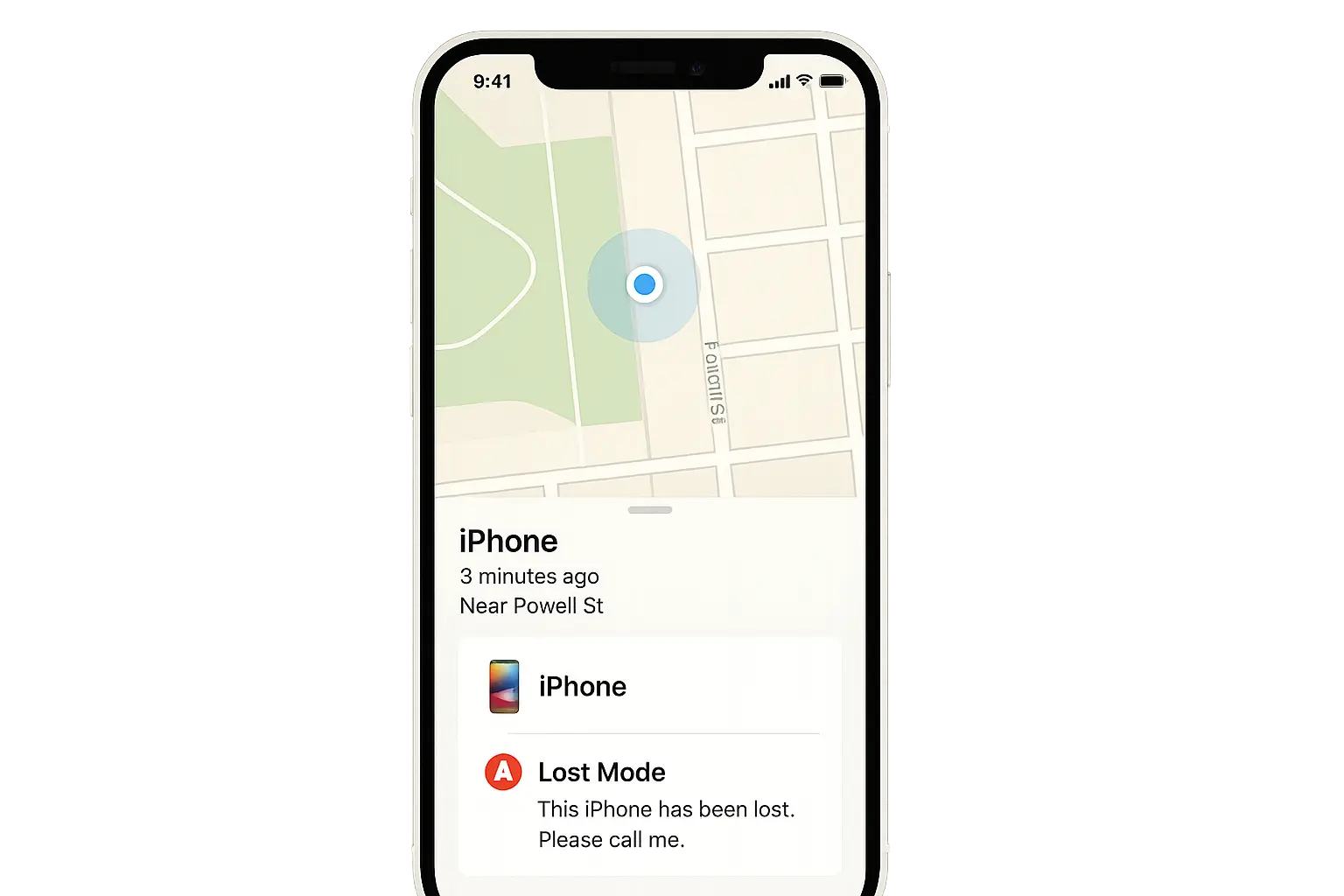
Protect Everything Else
Here's the thing everyone forgets: your phone has access to your entire digital life. Start changing passwords immediately. Securing your digital accounts and personal information often matters more than recovering the physical device.
Hit the Big Ones First
Change passwords for banking, email, and social media accounts immediately. These are the highest-value targets for thieves and can cause the most damage if compromised.
Hit the big ones first:
Banking apps
Email accounts
Social media
Any apps with payment info
Enable two-factor authentication on every account that supports it. This adds an extra layer of security that makes stolen account credentials much less useful to criminals.
Financial Protection Mode
Contact your bank and credit card companies to report potential compromise. They can monitor for unusual activity and issue new cards if necessary to prevent fraudulent charges.
Place fraud alerts on your credit reports with all three major bureaus. This makes it harder for thieves to open new accounts in your name using information from your phone.
Consider identity theft protection services if your phone contained sensitive documents, photos of IDs, or other personal information that could enable identity fraud.
The Waiting Game
Sometimes phones show up days or weeks later. Keep monitoring Find My, but don't obsess over it. If the location hasn't changed in 24 hours, the phone is probably dead or destroyed.
You can remotely wipe your phone, but think twice about it. Once you wipe it, you can't track it anymore. Sometimes it's worth leaving it trackable for a few days to see if police can recover it.
A teacher whose iPhone was stolen during a school event discovered thieves had accessed her mobile banking app within hours. Because she immediately contacted her bank and changed her passwords, they were able to reverse fraudulent transfers totaling $3,200 and prevent additional account access. Her quick response saved thousands in potential losses.
Post-Theft Response Timeline:
First 15 Minutes:
Access Find My from another device
Activate Lost Mode with contact info
Screenshot location data
Call police non-emergency line
First Hour:
File detailed police report with IMEI
Change banking and email passwords
Enable 2FA on critical accounts
Contact wireless carrier to suspend service
First 24 Hours:
Monitor Find My location updates
Review all account activity for breaches
Contact credit bureaus for fraud alerts
Notify employer if work data was on device
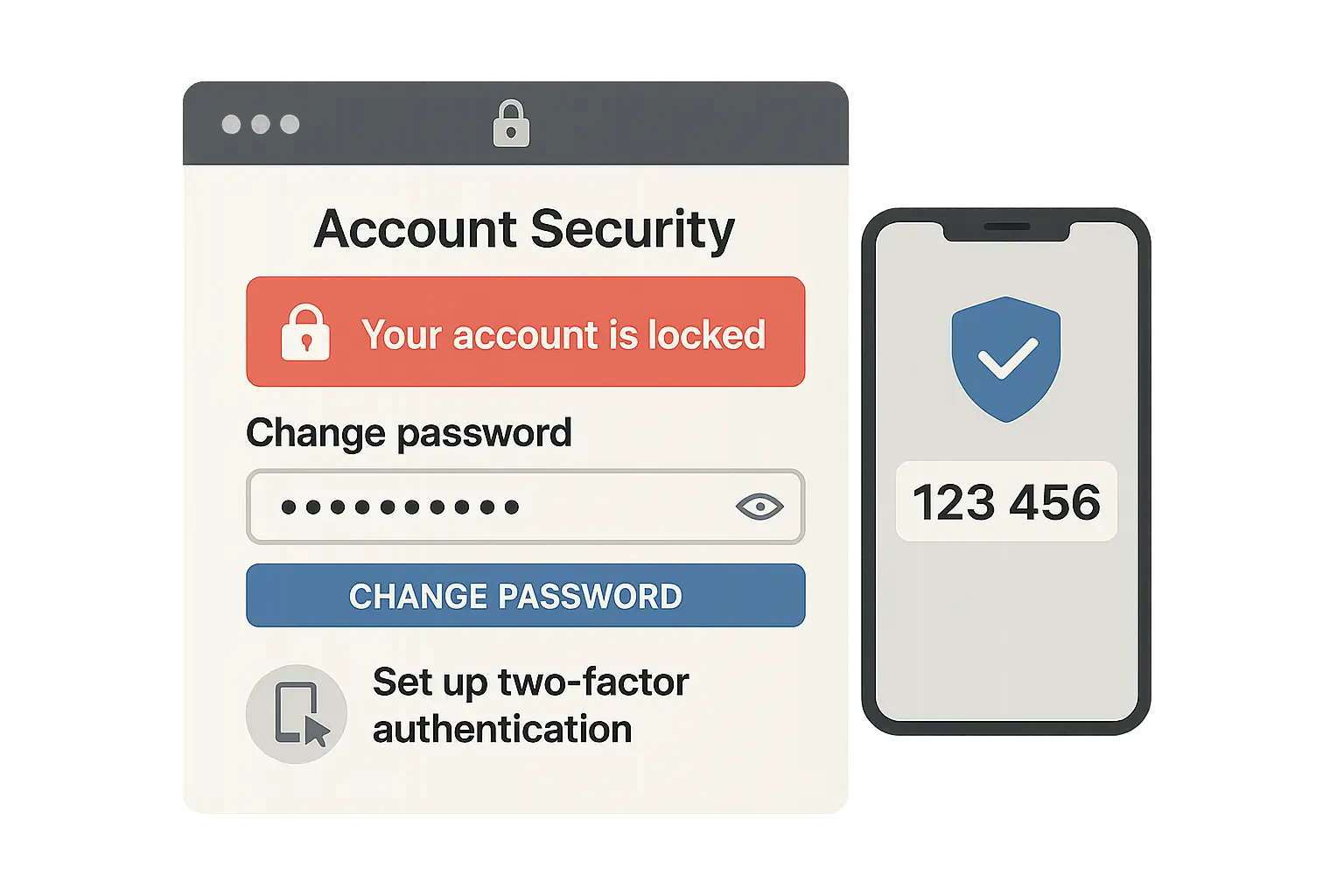
Final Thoughts
Look, iPhone theft is going to happen to some people no matter what. But with the right preparation, you can make yourself a much harder target and protect what matters most—your data and your peace of mind.
The crazy thing is how much of this stuff works automatically once you set it up. Your phone literally gets smarter about protecting itself over time. Stolen device protection, Find My network, and Activation Lock all function behind the scenes, turning your phone into a tracking beacon that's essentially worthless to criminals.
The key is preparation—setting up these protections before you need them. I've seen too many people discover their security settings were incomplete only after their phone disappeared. Take 15 minutes today to check your settings. Enable the protections. Think about how you carry and use your phone in public.
For those working in high-risk environments or simply wanting maximum protection to protect your iPhone from theft, Rokform's military-grade cases provide the physical security foundation that complements iOS's software protections. Their rugged polycarbonate construction with 6-foot drop protection ensures your device stays functional for tracking even during theft attempts, while the distinctive professional appearance serves as a visual deterrent to opportunistic thieves.
Remember, the goal isn't just getting your phone back—it's protecting the digital life stored inside it. Your photos, messages, financial apps, and personal data are often worth more than the device itself. The strategies in this guide protect both the hardware and everything that makes your iPhone truly yours.









